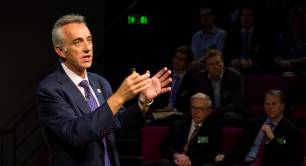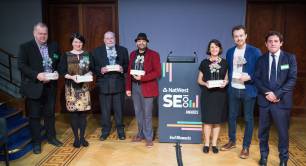Impact investment stakes higher than ever, says GIIN chair
The stakes are getting higher and higher in the constantly evolving impact investment global market says Antony Bugg-Levine, an international leader in social impact investing.
Bugg-Levine is recognised as one of the individuals who coined the term ‘impact investment’ and is currently chair of the Global Impact Investing Network (GIIN). He described his observations, concerns and hopes about the way in which this relatively new financial market is developing to delegates at the 2015 Critical Mass conference in London.
“In one month this year President Obama, Prime Minister Cameron and the Pope all talked about impact investing. The stakes are high and getting increasingly higher. Not only in rhetoric but also on the ground. Impact investing is making a difference to people’s lives,” Bugg-Levine told over 400 delegates.
He went on to describe this difference and said “this morning in Liverpool a mother dropped her child off at a centre that’s providing a safe environment, quality food and education to young children in an affordable manner and one that really accommodates the working parents who send their children there”. That centre exists because of an impact investment facilitated by the UK-based organisation the Social Investment Business.
As the stakes increase and awareness of impact investment grows, so do the challenges facing those in the social investment world. Bugg-Levine explained how when deciding whether to attend the conference he contacted a friend in England who replied, “if there’s one conference you should come to, it is this one”. The friend continued: “This is the one where people actually tell the truth and talk honestly.”
Acting on this insight Bugg-Levine went on to address some of the key challenges he identifies, referring to a speech by Robert F. Kennedy he included “futility, expediency, timidity, comfort and self righteousness”. He said that the danger of those who have been involved in impact investment for a number of years “giving up due to frustrations over slowness of progress is very real”. He also argued that “this is not the time to be timid... nor to be tempted by the seemingly easier option of taking slightly higher salaries and flying business class” in another job.
The point which seemed to resonate most with delegates was that around self righteousness. “Don’t think you’re owed anything” just because you are trying to create a positive social impact, he said.
“In this world of impact investing and social enterprise we have the highest ratio of words spoken in comparison to deals done… the theory is so compelling it is easily hyped in comparison to the reality on the ground,” Bugg-Levine concluded.
Joining Bugg-Levine on the panel at Critical Mass was Marcelino Castrillo, managing director of business banking at RBS, Diana Verde Nieto, founder and CEO of Positive Luxury, Rodney Irwin, managing director of the World Business Council for Sustainable Development and Jan Owen, CEO of the Foundation for Young Australians.
In response to an audience question about how hype around impact investment should be managed, Irwin said: “Businesses should not be hyping up their performance... my advice is to stay humble and keep it based on metrics.”
Bugg-Levine, who at the beginning of the discussion likened the gathering of those at Critical Mass to a wedding, where every now and again extended family gathers, welcoming new additions each time, responded: “Within the family we need to be honest and suppress the hype and get real.
“I’m against hype in this room but outside of here we are not going to get anywhere by telling a very nuanced, complicated and possibly depressing story. If there is hype in this room we can’t learn anything, but outside of this room we need a coherent, clear and inspiring message.”
Students should be taught that business as usual is not sustainable
Having heard the scientific definition of critical mass as ‘getting the right amount of material available for enough time to reach the point at which change can take place’, the panel were tasked with responding to the question: how can we achieve critical mass for global businesses, governments, investors, social enterprises and charities?
Irwin stated that we are far from achieving the critical mass needed to make businesses prioritise positive social and environmental change – comparing the current situation to the starting line of the London marathon. He argued that education is key to this shift taking place. “Educators, professors and academics are usually rewarded on how much they publish and the way in which they publish – a lot of that research is of absolutely no practical use whatsoever.
“I believe we need to fund different ways of education and look at the motivations of doing research in universities. Business practise needs to be focussed on applied research that can be actionable and used,” he argued. Irwin also said that socially and environmentally responsible business practice should be taught in all business schools, and not siloed as optional modules for the conscientious student.
“Students should be taught that business as usual is not sustainable,” he concluded.
In addressing the same question Bugg-Levine cited empathy as crucial to achieving critical mass. “Lack of empathy leads to frustrations and distrust,” he said.
“What is necessary in order for us to reach critical mass is to truly understand the constraints other people are facing.” We need to step back and acknowledge regulations and bureaucracy in government for example, as well as the key barriers facing investors said Bugg-Levine.
The Critical Mass conference is taking place at the Royal Institution of Great Britain on the 19th and 20th of October and will host over 500 delegates. It is organised by one of the UK’s founding B Corps Matter&Co with the support of partners including RBS, PwC and the British Council.
Photo credit: Matthew Herring, Matter&Co



